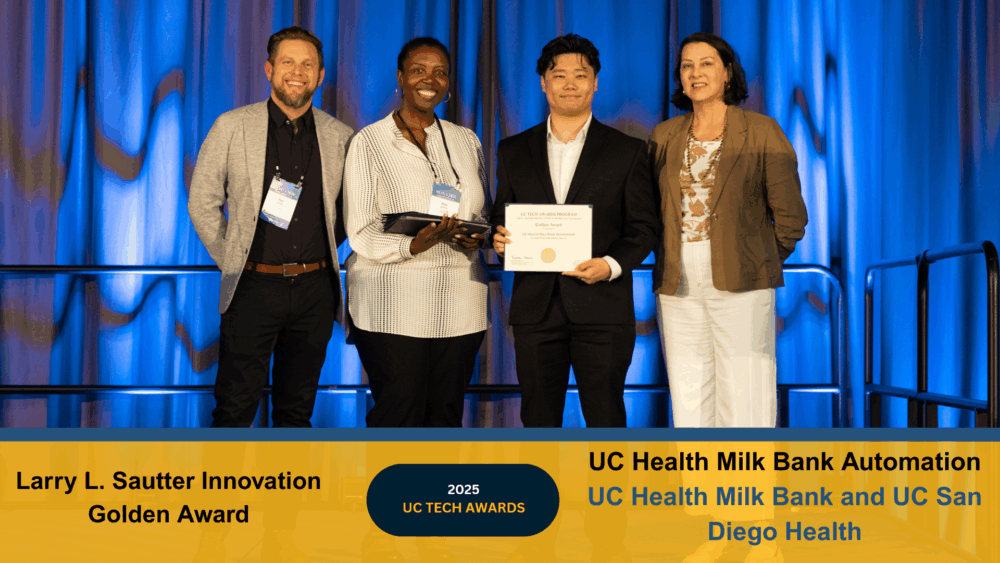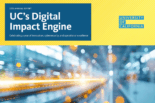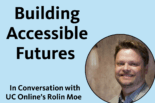Overview
Alison Wolf and Zammy Wang won the Golden Larry L. Sautter Award for Innovation in Information Technology at the 2025 UC Tech Awards for their work with the University of California Health Milk Bank, a non-profit entity operated by UC San Diego Health. The partnership led to implementing an automation technology to address the need for a globally unique identification system for human milk donations and expand donor milk into new markets. The initiative supports traceability and biovigilance of pasteurized donor human milk, resulting in improved patient safety and expanded equitable access for vulnerable populations.
The Challenge
The University of California Health Milk Bank, which opened in 2020, is a non-profit donor milk bank that collects, processes, screens, and distributes pasteurized donor human milk to Neonatal Intensive Care Units and medically fragile newborns throughout the state. Human milk is protective against Necrotizing Enterocolitis, a devastating bowel disease that affects premature and small infants. The milk bank is a member of the Human Milk Bank Association of North America (HMBANA), and the state-of-the-art facility is co-located within the San Diego Blood Bank.
The Timeless Milk Bank Management System (MBMS) is the only approved milk bank management system in the US. With 31 non-profit milk banks in all of the US and Canada, there is not a large market for expansion. For donor milk ready for distribution, MBMS produces a label with a proprietary barcode readable only by the same vendor system. NICUs and other health care facilities that are not using the same vendor in their patient care units cannot scan these products, which is a basic and reliable patient safety activity. The lack of a standard scannable label also limits UC Health Milk Bank’s growth and onboarding of new hospitals that are not using Timeless MBMS.
In addition, the World Health Organization issued a statement in 2013 recommending all medical products of human origin have a globally consistent coding system. In response to this recommendation and the blood crisis during the Gulf War, the International Council for Commonality in Blood Banking Automation (ICCBBA) created ISBT-128—a global standard for the terminology, identification, coding, and labeling of medical products of human origin. The international blood bank community currently uses ISBT-128.
The need for standardized coding for full traceability and patient safety, coupled with a milk bank management system unable to support this critical mission, created a unique opportunity for the milk bank to partner with UC San Diego Health Enterprise Automation. The issue was how to translate the data from Timeless MBMS into ISBT-128-compliant language that could then be pulled into labeling software. The translation needed to happen easily with minimal steps that would not impact standard milk bank workflows. Additionally, there was no dedicated funding to solve the problem.
The Approach

The Enterprise Automation team developed a lightweight application that applies automation to produce the universal ISBT-128 barcodes and labels safely and quickly. The coordination of multiple stakeholders ensured a smooth implementation of the new label. The team consulted other hospital milk tracking vendors, including Keriton, MilkTracker, and Cerner Bridge, throughout the process to ensure readability by the different systems. Epic experts were also employed to understand how ISBT-128 language integrates with electronic medical records (EMR). And finally, NICU team members, dieticians, and bedside staff provided recommendations on label components.
The Impact
The automation application created an ISBT-128 label using a simple process that can be expanded to all HMBANA milk banks. The long-term goal is to create a web-based program that could be implemented worldwide, specifically in limited-resource areas. The new donor milk label will be used on all bottles sent to hospitals for readability by multiple milk tracking systems, leading to safer patient care and improved traceability.
Current hospitals contracted with the UC Health Milk Bank, including all UC Health NICUs, benefit directly from the updated label. Regardless of the hospital milk tracking system, nutritional information and donor milk information can be scanned and pulled into the EMR, improving patient safety. This advancement facilitates onboarding new hospitals, increasing equitable donor milk access statewide with potential future impact across the US, Canada, and globally.
Key outcomes include:
- An industry-wide workshop of ICCBBA, milk banks, milk tracking vendors, clinicians, and other leaders to explore how the technology can be leveraged across the industry.
- Engaged conversations with other leading hospital milk tracking vendors to optimize their software.
- A submitted ICCBBA Enterprise 2025 Grant to optimize the technology scalability to resource-limited areas outside the US.
- An invitation to speak at the ICCBBA annual board meeting to discuss how automation might be implemented on a larger scale.
Why It Matters
This initiative aligns with the award category and the university’s mission of serving the people of California by transforming a business process through reliability, speed, scale, efficiency, and effectiveness. The simple automation and coordination of various technologies improved patient safety, increased equitable access to donor milk, and contributed to milk bank growth. In addition:
- The technology opens the business to new and more customers, expanding equitable access to high-quality donor milk. When the UC Health Milk Bank opened in 2020, only 69% of California NICUs offered donor milk. Through advocacy, partnership, education, and legislation (AB 3059), the milk bank increased that number to 99% of NICUs offering or in the process of offering donor milk.
- The technology saved five hours of manual data manipulation per week, reallocating labor to higher-value activities and achieving indirect cost savings. With an anticipated growth of 50% in FY26, this technology is projected to save additional staff time exponentially.
- The technology is positioned to be shared across North America and internationally to improve health outcomes for vulnerable children worldwide.
This project brought together the passion of the milk banking community, patient advocates, and the expertise of the UC San Diego Health Enterprise Automation team to create a process with a lasting impact.
What’s Next
The team plans to:
- Pursue the ICCBBA Enterprise 2025 Grant to refine and scale the technology for global application, especially in resource-limited settings.
- Continue collaborations with milk tracking vendors to optimize software compatibility.
- Expand the web-based program to facilitate worldwide implementation of standardized donor milk labeling.
Meet the Award-Winning Team
Award Category: Larry L. Sautter Award for Innovation in Information Technology
Locations: UC Health Milk Bank and UC San Diego Health
2025 Gold UC Innovation Award Winners:
- Alison Wolf – Executive Director, UC Health Milk Bank
- Zammy Wang – Enterprise Automation Engineer, UC San Diego Health
- Allen Tran – Senior Director, Applications, UC San Diego Health
- Nguyen Nguyen – Milk Lab Technician, UC Health Milk Bank
Read More
- Read the team’s complete UC Tech Awards application
- Learn more about the UC Tech Awards Program
Contact

Senior Director, Applications
UC San Diego Health
[Cover image and event photo of Zammy Wang with UC CIO’s Matthew Gunkel, Aisha Jackson and Molly Greek courtesy of Andrew Castro]







